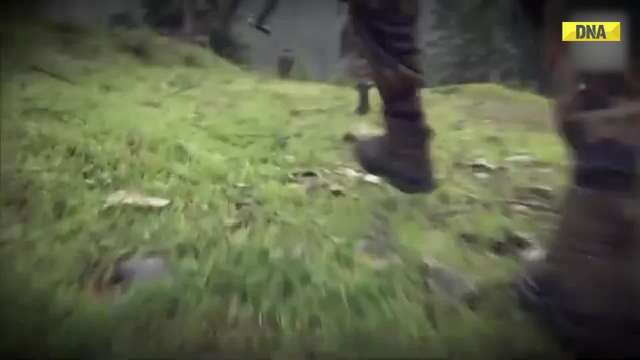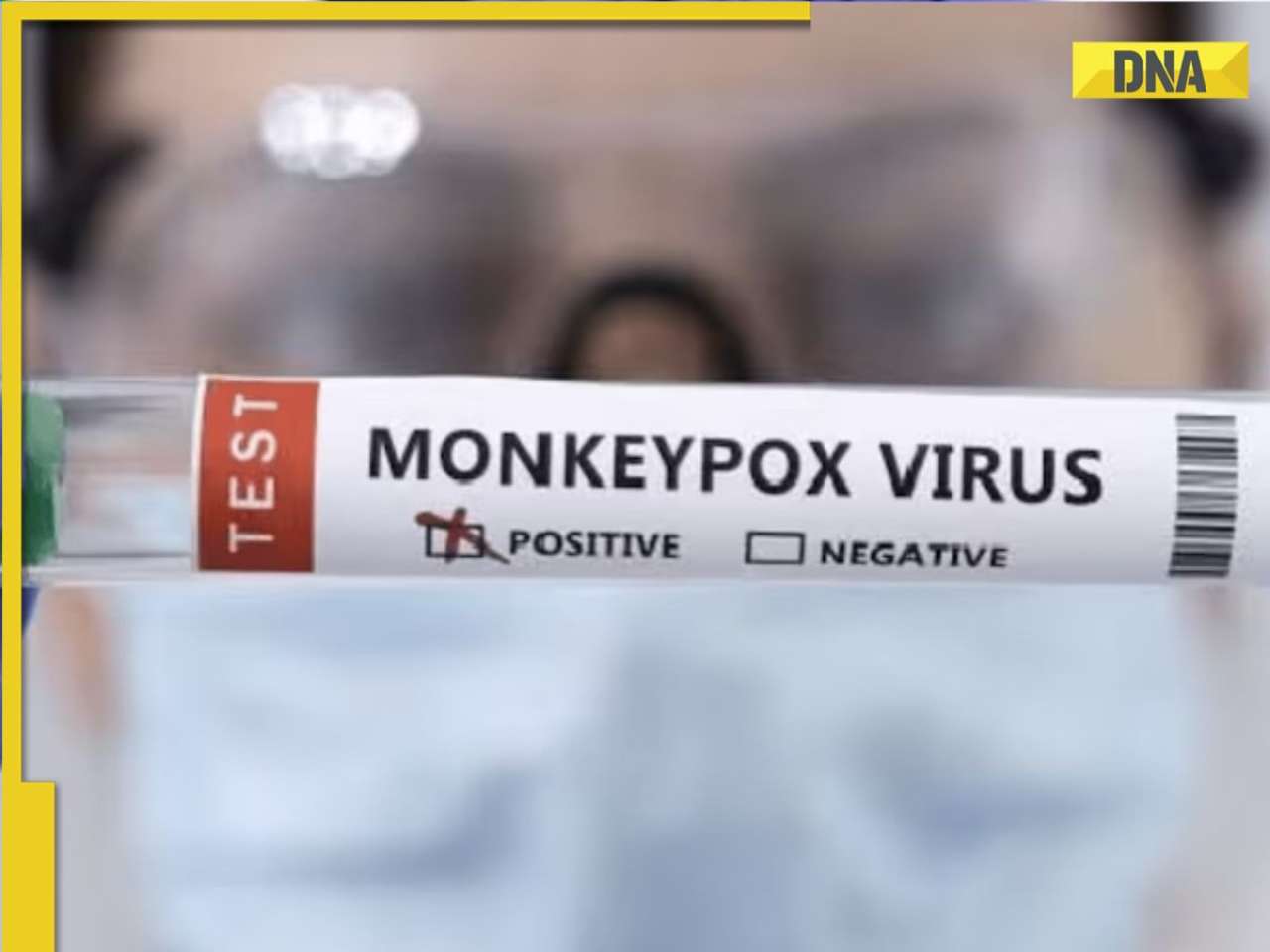- Home
- Latest News
![submenu-img]() Men in this Indian village have two wives, living under one roof due to…
Men in this Indian village have two wives, living under one roof due to…![submenu-img]() Meet Allah Ghazanfar, Afghanistan's 18-year-old mystery spinner who destroyed South African batting in 1st ODI
Meet Allah Ghazanfar, Afghanistan's 18-year-old mystery spinner who destroyed South African batting in 1st ODI![submenu-img]() Fired techie LinkedIn post goes viral, shares his 'survival' story after working as Swiggy delivery agent
Fired techie LinkedIn post goes viral, shares his 'survival' story after working as Swiggy delivery agent![submenu-img]() Not Soham Shah, but this actor was leading Tumbbad, took no money, gave two months, then hurled abuses on director for..
Not Soham Shah, but this actor was leading Tumbbad, took no money, gave two months, then hurled abuses on director for..![submenu-img]() IND vs BAN 1st Test: Predicted playing XIs, live streaming, pitch report and weather forecast of Chennai
IND vs BAN 1st Test: Predicted playing XIs, live streaming, pitch report and weather forecast of Chennai
- Webstory
- DNA Hindi
![submenu-img]() Jammu and Kashmir Assembly Elections 2024: 'कोई ताकत नहीं लौटा सकती अनुच्छेद 370' PM Modi ने दिया पाकिस्तान को चैलेंज
Jammu and Kashmir Assembly Elections 2024: 'कोई ताकत नहीं लौटा सकती अनुच्छेद 370' PM Modi ने दिया पाकिस्तान को चैलेंज![submenu-img]() IND vs BAN 1st Test Day 1 Highlights: अश्विन का शतक, जडेजा ने भी जमाया रंग; चेन्नई टेस्ट के पहले दिन टीम इंडिया ने बनाए 339 रन
IND vs BAN 1st Test Day 1 Highlights: अश्विन का शतक, जडेजा ने भी जमाया रंग; चेन्नई टेस्ट के पहले दिन टीम इंडिया ने बनाए 339 रन![submenu-img]() इतना आसान नहीं है ‘एक देश-एक चुनाव’, क्या धारा 370 और GST की तरह हो सकता है प्रदर्शन?
इतना आसान नहीं है ‘एक देश-एक चुनाव’, क्या धारा 370 और GST की तरह हो सकता है प्रदर्शन?![submenu-img]() बिहार के सिंघम ने क्यों दिया अचानक इस्तीफा, IPS शिवदीप लांडे ने मीडिया के सामने आकर बताई वजह
बिहार के सिंघम ने क्यों दिया अचानक इस्तीफा, IPS शिवदीप लांडे ने मीडिया के सामने आकर बताई वजह![submenu-img]() 'संसद में भी बोलूंगा, गांधी परिवार ने पंजाब जलाया' Rahul Gandhi के सिखों वाले बयान पर फिर बोले Ravneet Singh Bittu
'संसद में भी बोलूंगा, गांधी परिवार ने पंजाब जलाया' Rahul Gandhi के सिखों वाले बयान पर फिर बोले Ravneet Singh Bittu
- Automobile
![submenu-img]() Ford to return to India after 2 years with reopening of....
Ford to return to India after 2 years with reopening of....![submenu-img]() Maruti Suzuki launches new Swift CNG, check price, mileage, other features
Maruti Suzuki launches new Swift CNG, check price, mileage, other features![submenu-img]() ‘30 LPA, 3BHK, no in-laws’: Woman earning Rs 1.32 lakh salary lists demands for future husband, netizens say...
‘30 LPA, 3BHK, no in-laws’: Woman earning Rs 1.32 lakh salary lists demands for future husband, netizens say...![submenu-img]() In a big EV push, Centre launches Rs 10900 crore PM E-Drive scheme to replace…
In a big EV push, Centre launches Rs 10900 crore PM E-Drive scheme to replace…![submenu-img]() World’s longest car has helipad, swimming pool, mini-golf course, can seat over…; it cost…
World’s longest car has helipad, swimming pool, mini-golf course, can seat over…; it cost…
- Education
![submenu-img]() Meet man, who secured record-breaking package, not from IIT, IIM, NIT, his salary is...
Meet man, who secured record-breaking package, not from IIT, IIM, NIT, his salary is...![submenu-img]() Meet India's first billionaire, who controlled 25% of world's GDP, had 50 Rolls-Royce, way richer than Mukesh Ambani
Meet India's first billionaire, who controlled 25% of world's GDP, had 50 Rolls-Royce, way richer than Mukesh Ambani![submenu-img]() IAS vs IPS: Who earns more? Differences in power, role, responsibilities
IAS vs IPS: Who earns more? Differences in power, role, responsibilities![submenu-img]() Meet boy who got record-breaking salary package from Google, was former Amazon employee, not from IIT, IIM…
Meet boy who got record-breaking salary package from Google, was former Amazon employee, not from IIT, IIM…![submenu-img]() Meet man who became IPS, then cracked UPSC to become IAS officer with AIR 52, is now DM of...
Meet man who became IPS, then cracked UPSC to become IAS officer with AIR 52, is now DM of...
- Videos
![submenu-img]() Delhi New CM: Why Delhi CM Atishi Marlena Singh Dropped Her Middle Name, Fascinating Story Behind It
Delhi New CM: Why Delhi CM Atishi Marlena Singh Dropped Her Middle Name, Fascinating Story Behind It![submenu-img]() Haryana Assembly Election 2024: Congress Announces Seven Guarantees, Check Full List Here I Politics
Haryana Assembly Election 2024: Congress Announces Seven Guarantees, Check Full List Here I Politics![submenu-img]() Lebanon Pager Explosion Update: 8 Killed, 2,750 Injured; Hezbollah Blames Israel For Pager Attack
Lebanon Pager Explosion Update: 8 Killed, 2,750 Injured; Hezbollah Blames Israel For Pager Attack![submenu-img]() Pakistani Intruder Shot Dead By BSF Along International Border In Amritsar, Punjab
Pakistani Intruder Shot Dead By BSF Along International Border In Amritsar, Punjab![submenu-img]() Kolkata Doctor Case: Protesting Doctors React After CBI Arrests Sandip Ghosh And Abhijit Mondal
Kolkata Doctor Case: Protesting Doctors React After CBI Arrests Sandip Ghosh And Abhijit Mondal
- Business
![submenu-img]() Gautam Adani breaks silence on reports of Kenya Airport Authority accepting his company's proposal in 17 days
Gautam Adani breaks silence on reports of Kenya Airport Authority accepting his company's proposal in 17 days![submenu-img]() Mukesh Ambani's gift for Reliance customers, 1-year Jio AirFiber connection for free but on one condition
Mukesh Ambani's gift for Reliance customers, 1-year Jio AirFiber connection for free but on one condition![submenu-img]() Deepika Padukone buys 1845 sq ft apartment near her mother-in-law's house in Mumbai, it worth Rs...
Deepika Padukone buys 1845 sq ft apartment near her mother-in-law's house in Mumbai, it worth Rs...![submenu-img]() Meet man, who got Rs 30 crore salary hike, leads Rs 1572 crore company that once offered job to Ratan Tata, he is...
Meet man, who got Rs 30 crore salary hike, leads Rs 1572 crore company that once offered job to Ratan Tata, he is...![submenu-img]() Mukesh Ambani buys India’s first Boeing 737 MAX 9, it’s priced over Rs…
Mukesh Ambani buys India’s first Boeing 737 MAX 9, it’s priced over Rs…
- Photos
![submenu-img]() Meet actor who became superstar with blockbuster debut, signed 47 films in 11 days; never gave another hit, is now...
Meet actor who became superstar with blockbuster debut, signed 47 films in 11 days; never gave another hit, is now...![submenu-img]() 7 unsung women scientists whose discoveries changed the world
7 unsung women scientists whose discoveries changed the world![submenu-img]() This controversial film was banned during Emergency, prints were burnt, was reshot but...
This controversial film was banned during Emergency, prints were burnt, was reshot but...![submenu-img]() 10 amazing images captured by Hubble Space Telescope
10 amazing images captured by Hubble Space Telescope![submenu-img]() From Kilimanjaro National Park to Aldabra Atoll: 7 UNESCO world heritage sites that have high entry fees
From Kilimanjaro National Park to Aldabra Atoll: 7 UNESCO world heritage sites that have high entry fees
- India
![submenu-img]() Mpox Scare: Man tests positive in Kerala after returning from...
Mpox Scare: Man tests positive in Kerala after returning from...![submenu-img]() Indus Water Treaty: India serves formal notice to Pakistan, seeking...
Indus Water Treaty: India serves formal notice to Pakistan, seeking...![submenu-img]() 'One Nation, One Election' approved by Centre: What it means for India's election system?
'One Nation, One Election' approved by Centre: What it means for India's election system?![submenu-img]() Kolkata doctor rape-murder case: TMC MP Abhishek Banerjee demands CBI's..., says...
Kolkata doctor rape-murder case: TMC MP Abhishek Banerjee demands CBI's..., says...![submenu-img]() Union Cabinet approves 'One Nation, One Election' proposal, Bill likely in winter session
Union Cabinet approves 'One Nation, One Election' proposal, Bill likely in winter session
















































)
)
)
)
)
)
)
)
)
)
)
)
)
)





)
)
)
)
)
)